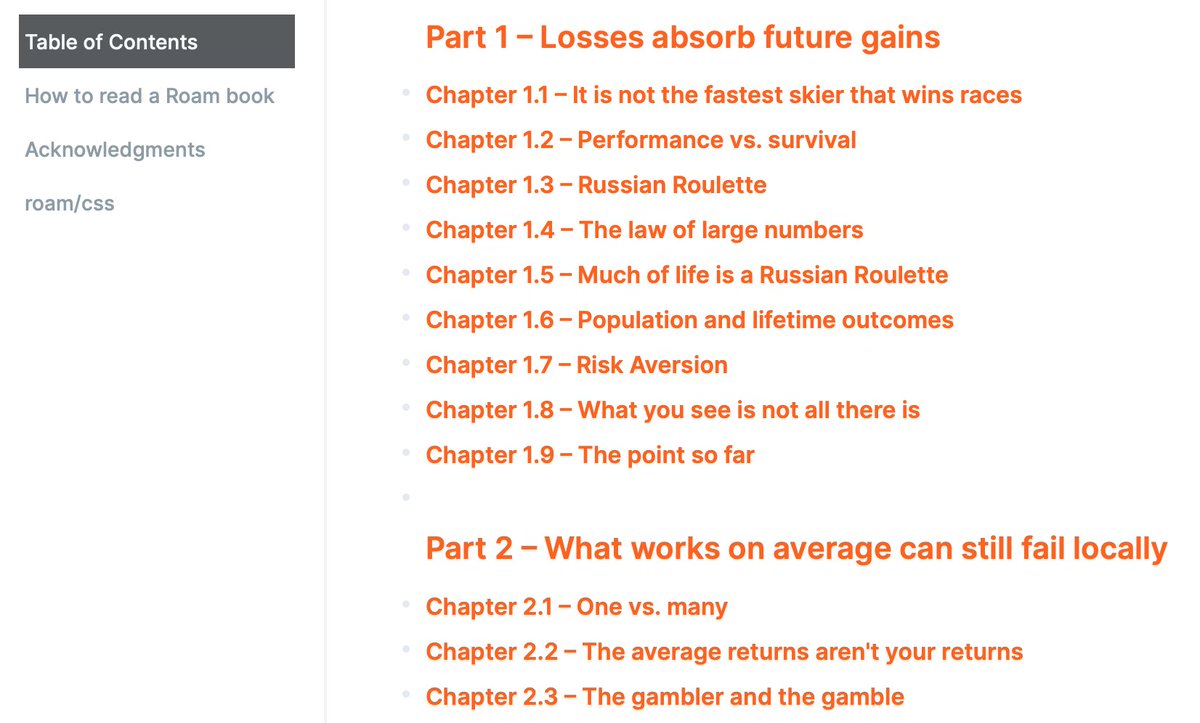
THE FUTURE OF NEWSLETTERS
(and announcing my new newsletter 🎉)
Too much noise, too little content we actually use.
Take your favorite newsletter. Can you remember the contents of the edition-before-the-last-one?
Me neither. But I have a solution
(thread, 1/N)
(and announcing my new newsletter 🎉)
Too much noise, too little content we actually use.
Take your favorite newsletter. Can you remember the contents of the edition-before-the-last-one?
Me neither. But I have a solution
(thread, 1/N)
2/ Today, I launch the RoamLetter.
A newsletter whose content directly integrates into your note-taking system.
A newsletter whose editions AUTOMATICALLY link with each other *and with your notes* 👏
A newsletter with built-in spaced repetition.
A timeless newsletter.
A newsletter whose content directly integrates into your note-taking system.
A newsletter whose editions AUTOMATICALLY link with each other *and with your notes* 👏
A newsletter with built-in spaced repetition.
A timeless newsletter.
3/ If you are a Roam user, you'll enjoy how the topics of one edition of my newsletter automatically link with your body of knowledge, and the other way around.
If you are not a Roam user, no worries. You can still use all the other features of my newsletter (pics below)
If you are not a Roam user, no worries. You can still use all the other features of my newsletter (pics below)
4/ I write personally all the content of the newsletter.
So, you'll read what I'm known for.
Timeless content, comments on the principles ruling this world, complex systems, emergent behaviors, adaptive management, and much more.
Get a look inside: luca-dellanna.com/roamletter
So, you'll read what I'm known for.
Timeless content, comments on the principles ruling this world, complex systems, emergent behaviors, adaptive management, and much more.
Get a look inside: luca-dellanna.com/roamletter
5/ Every week, I will publish essays of mine, most of them exclusive to the newsletter, or present my comments on the essays of others (links to them + one-paragraph take-away of one key idea + my thoughts expanding and building upon them).
All categorized, for easier reference.
All categorized, for easier reference.

6/ Here is an example of what I mean by "building upon".
If you are familiar with my writing, you'll know that I don't regurgitate the works of others, but take away some principles and apply them to different contexts – or make novel hypotheses.
If you are familiar with my writing, you'll know that I don't regurgitate the works of others, but take away some principles and apply them to different contexts – or make novel hypotheses.

7/ Every week, also a section on the best quotes and thoughts I came across. Again, with my comments. 

8/ Finally, a section on recent news – but never caring about the urgent, only about the important.
The aim is to highlight phenomena or principles that will still be relevant in a few decades.
The aim is to highlight phenomena or principles that will still be relevant in a few decades.

9/ Moreover, the newsletter comes with spaced repetition. Every 3 months I will send you a recap of the most important concepts I've talked about during the last few editions.
And once a year, a mega-recap.
And once a year, a mega-recap.
10/ You can subscribe here: luca-dellanna.com/roamletter
The first edition gets published this Saturday!
The first edition gets published this Saturday!
11/ Yes! Subscribers can ask questions, and I’ll answer them at the bottom of the following edition.
(Assuming the question is relevant and not confidential, trivial, or offensive)
(Assuming the question is relevant and not confidential, trivial, or offensive)
https://twitter.com/randiisan/status/1326932253620973568
12/ Also, there’s a time-limited pre-launch offer (Luca-Dellanna.com/RoamLetter)
13/ A few readers asked, "do I need Roam?"
No! There is an email-only version of the newsletter: luca-dellanna.com/premiumletter (which is distinct from my free "updates & occasional essay" newsletter)
No! There is an email-only version of the newsletter: luca-dellanna.com/premiumletter (which is distinct from my free "updates & occasional essay" newsletter)
• • •
Missing some Tweet in this thread? You can try to
force a refresh









